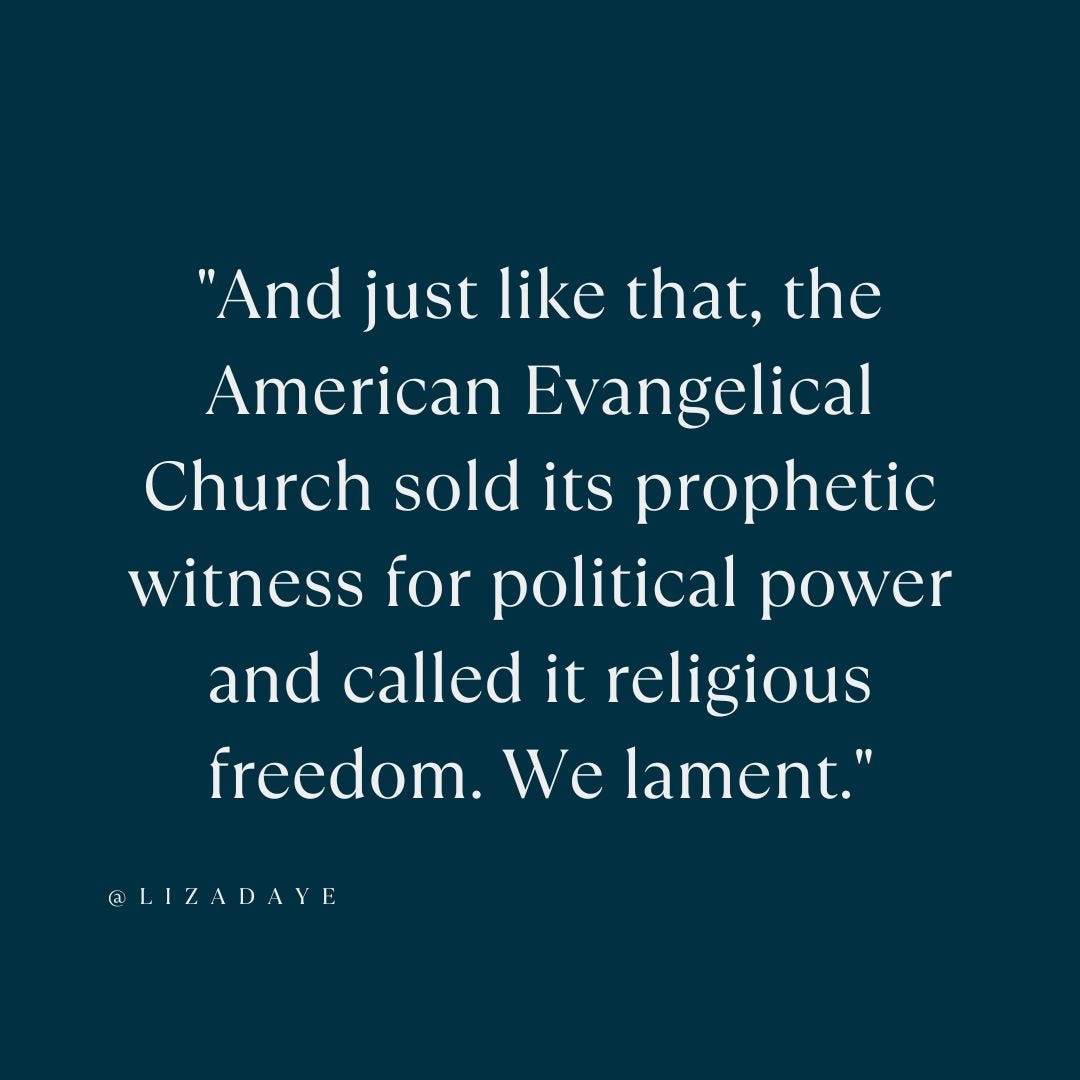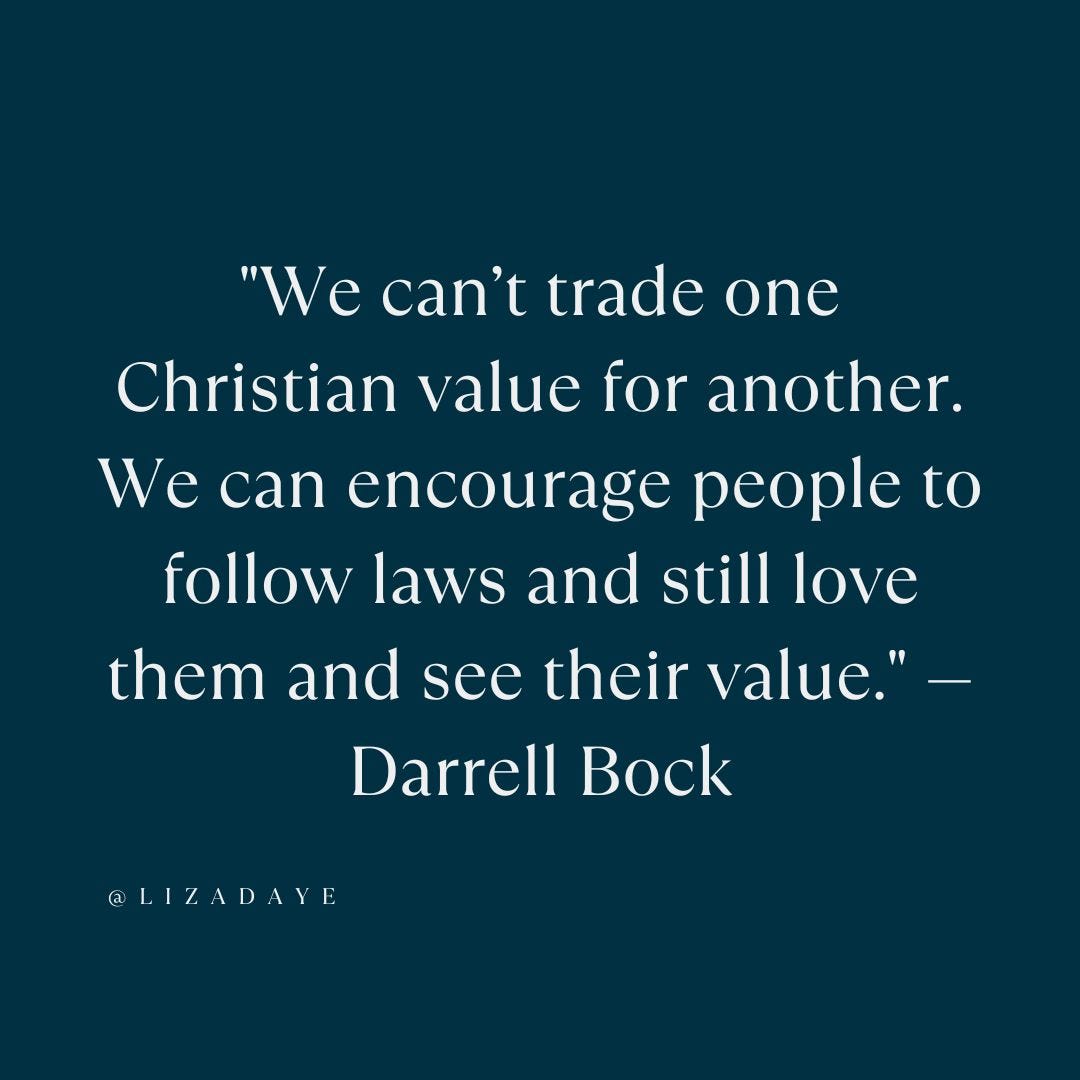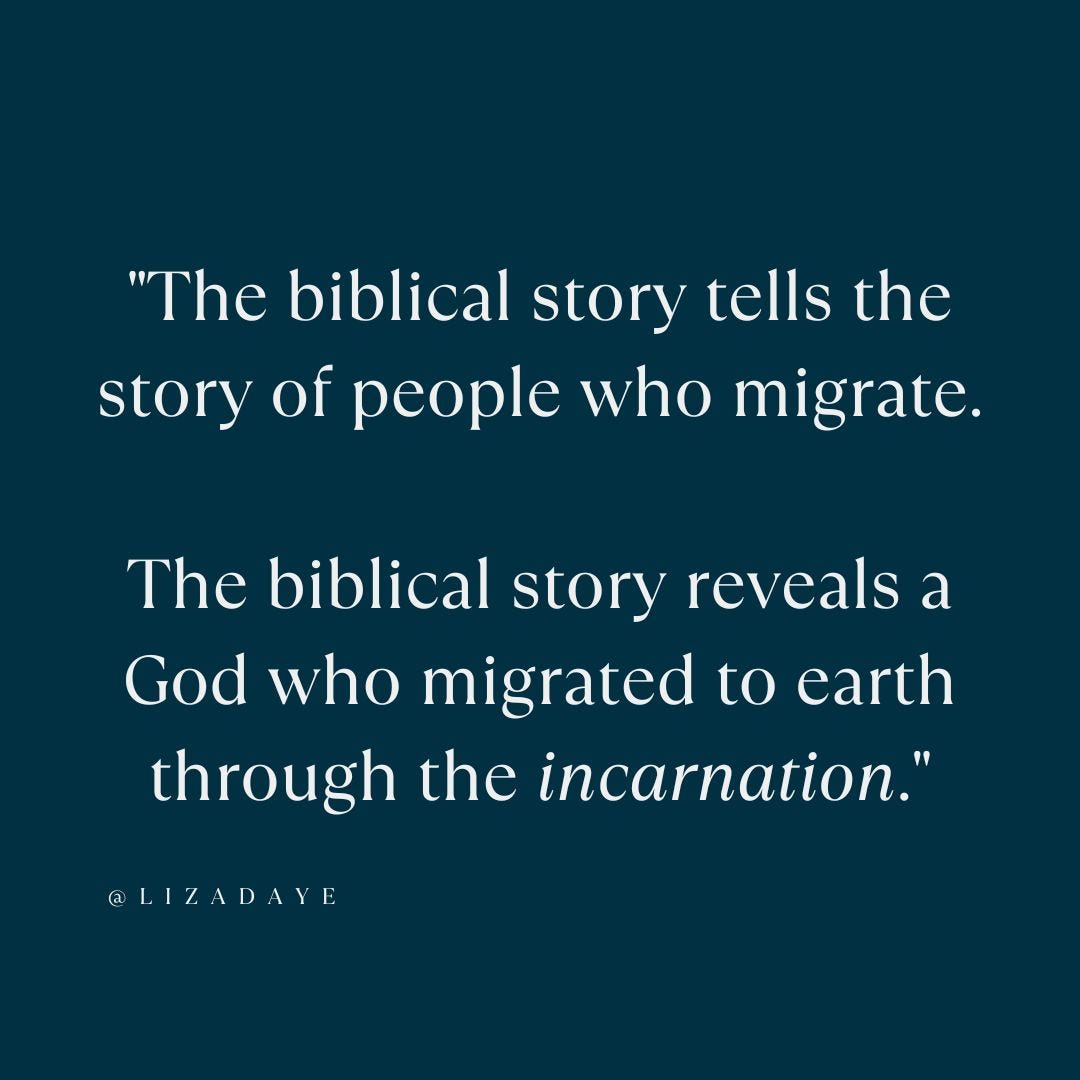"I didn't sign up for this"
American evangelicals with a conscience, immigration, and our prophetic witness
On November 6, I shared on Threads, “And just like that, the American Evangelical Church sold its prophetic witness for political power and called it religious freedom. And they don’t even care. Because they plan to use Trump just as much as he’s planning to use them. We lament.” To my surprise, these words resonated widely—not as a simple partisan grievance, but as a heart cry for democracy-loving conservatives too. So many of us grieve for our country and our most vulnerable neighbors—migrants, disabled people, the unhoused—because of their relationship to broken unjust systems. Yet despite the vitriol and chaos of Trump’s first term, Republicans—and 81 percent of theologically conservative evangelicals—chose him again, embracing him as their golden calf.
According to a recent survey conducted by PRRI, 61 percent of democratic leaning voters cited the health of our democracy as their primary voting issue, with the cost of every day expenses coming in second at 57 percent. Over 70 percent of polled Republicans identified immigration as the most critical issue, compared to just a quarter of Democrats. Republican support for pathways to citizenship has declined from 53 percent in 2013 to 36 percent in 2024, while 77 percent of Democrats continue to support such pathways under certain conditions. Notably, support for a path to citizenship among the majority of Americans still remains relatively stable at over 60 percent. Yet according to the same research, groups viewing immigration as a critical issue, such as Republicans, white evangelical Protestants, and Fox News viewers, show the lowest support for DACA and pathways to citizenship, while Democrats and independents largely back these policies. Specifically, 70 percent of Democrats support both, compared to 43 percent and 35 percent of Republicans, respectively.
Six in ten Americans agree that immigrants strengthen and support our economy, but currently less than half of white Protestant evangelicals affirm that statement. In fact, six in ten protestant evangelicals agree with the statement that “immigrants are poisoning the blood of the nation,” alarming rhetoric previously used by Nazis, Ku Klux Klan members, and other racist extremist groups.
Evangelicals do not function monolithically. Yet it matters more than ever that our evangelical attitudes towards immigration match our theological convictions, our ethical responsibilities, and the ways in which we seek to live out our faith in the public square. Because while many evangelicals celebrated Trump’s reelection as a divine blessing, migrant communities wailed with lament. If Trump promises that on day one, he plans to deport eleven million people, that policy separates families with minors and mixed-status marriages affecting between four to five million people instantly. DACA recipients, individuals with temporary status, and Afghan allies who supported our military are all vulnerable to these sweeping declarations.
Evangelicals with a conscience have a moral responsibility to say that God made migrants and asylum seekers in the imago Dei. As Dallas Theological Seminary’s Darrel Bock stated while addressing The National Association of Evangelicals at the convening of the Evangelical Immigration Table on November 13, “ Every human being is created in the image of God, and we are to treat them as such. Yes, we need to follow the law, but we can’t trade one Christian value for another. We can encourage people to follow laws and still love them and see their value.” We do not support policies that separate families, diminish human dignity, or deny due process. The key difference between the upcoming Trump administration and the previous one lies in accountability. In his first term, public servants functioned as guardrails. But many left after January 6, leaving the current cabinet selections wide open for power-hungry opportunists. Evangelicals, claiming moral authority, must now speak for vulnerable neighbors and disciple their congregants away from Fox News-flavored discipleship and toward a biblical ethic on migration. Rather than perpetuating harmful rhetoric about immigrants, the church should embrace a kingdom-minded approach to care and justice.
In the same way that God wanted Israel to choose solidarity with migrants and identify with them (Leviticus 19:34), the church in the New Testament illustrates a picture of a God who migrated to earth (John 1:14), the immigration of the church toward God (Philippians 3:20), kingdom citizenship (Ephesians 2:19), and the multiethnic family of God (Revelation 7:9). The testimony of scripture culminates in the future hope that “the leaves of the tree of life will heal the nations” (Rev 22:2). Because the kingdom of God is both now and not yet, we can lean into this idea of coming together in right relationship with creation to participate in reconciliation work right now. The biblical story tells the story of people who migrate. The biblical story reveals God who migrated to earth through the incarnation.
I spent last week on Capitol Hill with other immigration advocates. My leadership cohort from We Welcome joined forces with our friends from Women of Welcome, The Evangelical Immigration Table, The National Association of Evangelicals, World Relief, and The National Immigration Forum. We met with policy makers and legislators about what the next four years will look like for our most vulnerable neighbors. We advocated for The Afghan Adjustment Act, a solution for dreamers, a floor to the refugee resettlement program, and the bipartisan Dignity Act. We shared stories and concerns from constituents of faith and educated leaders on strategy and policy details.
And in speaking with conservative evangelicals about the reality of what migrants in America face, so many responded with a version of “I didn’t sign up for this.” They didn’t sign up for taking children from their parents. They didn’t sign up for the dehumanizing of people. They didn’t sign up for violent rhetoric. They didn’t sign up for decades of uncertainty and political punting for DACA recipients. They didn’t sign up for turning our backs on our translators that we relied on in Afghanistan.
So, what now? Evangelical Christian, if you want your voice to hold any weight, speak out against dehumanizing language, because the man 81% of your fellow evangelicals voted for won’t do so. Silence will worsen the violence marginalized groups face and render any semblance of a prophetic witness meaningless. It’s not conservative values that betray others—it’s supporting a violent man whose actions directly threaten their safety.
When our group from the National Immigration Forum spoke with Reverend Warnock’s office, we encouraged him as a faith leader to continue to use his voice for those on the margins. The senator describes himself as a Matthew 25 Christian, a title equally apt and relevant. The last half of Matthew 25 reminds readers that when history culminates, God will measure his followers based on our willingness to exist in proximity to and care for the vulnerable. “To the extent that you do these things to them, you have done for me.” Jesus reserves. “Well done, my good and faithful servant” for those who feed the hungry, clothe the naked, and welcome the stranger.
Yet in another meeting on Capitol Hill, we met with a staffer who represented her newly promoted boss. Stoic, except for the annoyed tapping of her fingers beneath the table, she responded with hopelessness, apathy, and even played the victim. At the end of the meeting, her notebook sat blank on the table, her pen untouched. The message was clear: “I do not care, and I’m not going to do anything.” Yet the words of Jesus separating the sheep and the goats refrain “To the extent that you are not willing to do anything for the least of these, you did not do for me as well.” The biblical text then pairs a warning with a word of hope for some, “Then they will go away to eternal punishment, but the just to eternal life.”
I still feel queasy when I think about Donald Trump’s reelection. But if you identify as an evangelical with a conscience, and you didn’t sign up for the mistreatment, vilification, and demonization of migrants, I’d encourage you find your prophetic voice while you still can. Speak truth to power. Show up for your vulnerable neighbors, even when it proves unpopular to do so. Come up with creative solutions in your own community that foster a spirit of good trouble. Take a risk to tell the truth. The Spirit rests with the remnant on the margins. You can join us if you want, but it might cost you the world. You in?
_________________________________________
As always, thank you for hanging out with me in this space. And I’m curious. Let’s do a temperature check. How do some of those stats make you feel? When you hear that the majority of American evangelicals affirm the statement “immigrants are poisoning the blood of the country,” what emotions rise to the forefront? What are you going to do about it? How will you model empathy for migrants in the face of partisan narratives that only seek to further marginalize vulnerable people? How will you champion human dignity and affirm the image of God in all people. keep the convo going in the comments below.









Just found you. I don’t think many people who support Trump realize just how damaging they are to Christian witness to younger people in this country. So many of them equate Christianity with hate it is heartbreaking. When you try to get them to realize it isn’t the majority, you get “you’re different, but…”. The loudest voices seem to define us, and it breaks my heart.
I am hoping to get a few things in my life fixed (widow on social security with financial issues; property tax needs caught up), then plan to participate every way I am physically able to. Such a mess we seem to find ourselves in.
Liz, this piece is filled with grace and conviction. Its so beautifully done. It also perfectly frames the loss of hope I have felt since the election. I no longer believe evangelicals will do what you have outlined. That their pastors will disciple them in such a manner, that they will see the responsibility before them and act. It's a culmination of many years of losing faith in the evangelical system. Believing she will right this wrong feels too much. God, how I long to be wrong. Praying words like these would reach those it needs to and prove me wrong after all. Grateful for them.